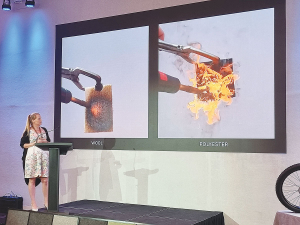Top wool advocate bales out
The conversion of productive farmland into trees has pretty much annihilated the wool industry.
 When burnt, the fire resistant Floc Panels produce little heat and less smoke than synthetic fibres.
When burnt, the fire resistant Floc Panels produce little heat and less smoke than synthetic fibres.
With Government backing, a New Zealand company has successfully developed a fire resistant, acoustic wall panel for commercial interiors made entirely from strong wool.
T&R Interior Systems Limited (T&R) was founded in 1992 by Steven Thwaite primarily as a distributor. However, it has evolved to become a leader in interior solutions and R&D around acoustic and non-structural seismic systems. This interest in interior acoustics led the company into looking at wool as a material for acoustic panels.
Called Floc Panels, technical director at T&R Hedda Landreth told Rural News Floc Panels are directly fixed to a wall.
“But it’s made out of 8-10mm worth of pure strong wool. Think of it like an acoustic wallpaper.”
To meet New Zealand’s strict building and fire code standards, T&R spent two years of development and refinement in which they came up with a brand-new, patent pending process to make the wool fire resistant up to Group 1-S. This is the highest classification achievable – without sacrificing its compostable, environmentally friendly characteristics.
“Burning Floc produces little heat, produces less smoke than synthetic fibres and results in a charred state where synthetics catch light and melt away from the flame.”
Campaign for Wool NZ chair Tom O’Sullivan describes T&R Interiors wool acoustic tile product as impressive.
“I would have to say this is one of the most exciting innovations for NZ strong wool that I have seen in a long time.”
Agriculture Minister Damien O’Connor says that the panels will provide a sustainable and environmentally friendly alternative to existing, predominantly synthetic products.
“Most existing acoustic products in are imported from overseas, so it’s great that a Kiwi company has invested to create this homegrown product,” he claims. “Innovations like these will resonate in our export markets and help them maximise their earning potential.”
Landreth says the domestic acoustic wall covering market is estimated to be worth between $35-50 million annually.
“Even if we could replace half of the current synthetic market we’re talking about a massive amount of strong wool. It’s down to us to ensure we do the product justice.”
Allied Market research has forecast the global market to increase by 6.3% to US$13.8 billion by 2031.
Landreth says that, in these early days, the priority is getting the panels moving in New Zealand, then expanding to export markets.
“We’re hoping that the New Zealand wool story and the traceability and properties of wool will make it a very attractive product overseas.”
T&R was awarded $303,200 from the Ministry for Primary Industries’ Sustainable Food and Fibre Futures (SFF Futures) fund to accelerate pre-commercial development of the wool panels. The amount of wool used is expected to increase as new export markets are targeted by the product.
"This project with T&R is just one of 15 projects funded through SFF Futures to date that are aimed at re-energising our strong wool sector,” O’Connor says. “It complements our establishment of Wool Impact, which is charged with driving innovation and demand for our strong wool.”
Former Fonterra executive Alex Turnbull has been appointed CEO to lead all five Yili Oceania Business Division companies in New Zealand.
Fonterra executive René Dedoncker is leaving the co-operative later this year to lead Australian agribusiness Elders.
Alliance Group and the Southland Stags rugby team have joined forces in a partnership that will see the the meat co-operative's farmgate brand feature on players' team kits and replica jerseys.
Fonterra's plan to expand its organic programme to the South Island is being well received by farmers, the co-op says.
Voting has started for the renewal of DairyNZ's milksolids levy.
The most successful catchment groups in NZ are those that have 'a source to sea' approach.

OPINION: Here w go: the election date is set for November 7 and the politicians are out of the gate…
OPINION: ECan data was released a few days ago showing Canterbury farmers have made “giant strides on environmental performance”.